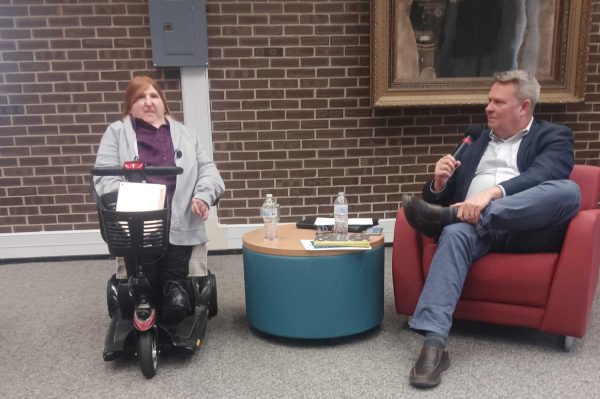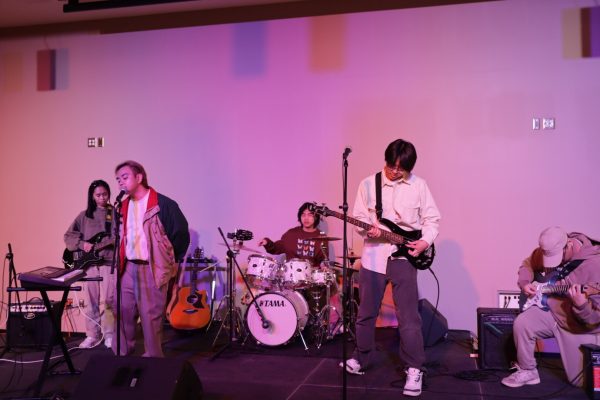Podcasting into the future
November 3, 2005
Technology is making learning more convenient with the trend of universities offering audio lectures through podcasting.
Podcasting is a subscription-based delivery model for audio and video files to be delivered via the Internet.
At this time, to Information Technology Services’ knowledge, there are no professors using NIU resources for this activity, but ITS would be willing to explore the concept if a customer were to commission ITS to do so, said Elizabeth Leake, associate director of Information and Technology Services.
“There are essentially no disadvantages to offering podcasting,” Leake said.
As long as the server activity is approved, faculty could post class lectures using podcasting, which would allow students to subscribe and receive automatic updates. They could then have the information for later review. Sessions could contain images such as slides, which are time-synced to the lecture, which would essentially produce a snapshot of a class or activity, Leake said. Subscribing to multiple instructors’ podcasts would be a great way to keep up with lectures and materials since it is completely automatic, Leake said.
“The applications for this technology are many, and multiplying,” Leake said.
Anyone with the desire to host their own radio or video show can easily do so, often with tools they already have. With the introduction of video podcasting, the service is extended to video as well. Student-run radio stations can podcast their own shows, Leake said.
Professor’s point of view
Associate professor of communication Joseph Scudder said he thinks podcasting would be a great learning tool for students.
“There’s no reason why professors here couldn’t do this,” Scudder said.
Podcasting is most beneficial for those who cannot physically make it to class, Scudder said.
Students who use podcasting have an opportunity to hear divergent viewpoints from other people besides their instructor, a tool Scudder said he thinks is very beneficial to students. Students can listen on a variety of subjects and in fairly short units.
Scudder, who owns an iPod, said he has several subscriptions to podcasts.
“You can listen to it whenever you want to,” Scudder said. “You can listen to it while driving or waiting for a plane.”
A combination of experiments lead to learning, that go further than the classroom, Scudder said.
“Part of it depends on the material. Different kinds of activities you might learn different things,” Scudder said. “Some people are better auditory learners, some people are better visual. It’s difficult to reach everyone through one certain way. I don’t think a student sitting in a classroom is the best way to learn.”
Podcasting can be a great advantage in the foreign language department, as a way to improve conversational skills, Scudder said.
Sophomore nursing major Becky Swinson said she benefits from audio learning more than visual learning. In her mythology class, students are required to attend the learning center where they are given different exercises in the lab. Swinson chooses the audio samples to learn from.
“Honestly, probably the only reason I go to class is for the audio,” Swinson said. “I can’t learn from printing off the notes.”
For those classes that require attendance, Swinson said she thought podcasting might help students for emphasis and repetition in their notes.
Possible problems
One problem Scudder said he finds with podcasting is the inconvenience of reviewing. A student cannot sift through an audio lecture as they would through their notes. Students cannot highlight spoken words.
Scudder said many people claim podcasting gives incentives for people not to come to class.
“They already do that,” Scudder said.
Many professors post their power point lectures on the internet, giving students the same opportunity to skip as podcasting would, Scudder said.
Administration may have an issue of control where podcasting is concerned, Scudder said.
“If you publish a podcast, anyone can download it,” Scudder said. “Someone can look at something and find it objectionable, and say ‘look at what this professor is doing in their class.’”
Tech specs
For students interested in podcasting, the process involved has three main components: content creation, content posting and content hosting.
Content creation can be done in a number of ways, including using a computer with sound recording capabilities, a current iPod with compatible microphone or older iPod with a third-party recording device like the iMic, Leake said. Podcasts can contain video as well as audio, and the latest iPods support viewing of video podcasts called VODcasts.
Content posting involves uploading the content to any web-accessible server location. A user creates a new blog entry, attaches the file using the same interface, and the podcast is automatically created, along with subscription links.
As for hosting, any server-type activity at NIU would need to be sanctioned by ITS. NIU bandwidth and storage are commodities that are not free. There are, however, several external free hosting services available over the Web.
As for servers used for storage and hosting, there are costs associated with creating them. For security reasons, ITS does not encourage students to set up their own servers, Leake said. There are also installation and monthly maintenance fees for a server connection. The hardware and software associated with server support can also be expensive. An approval by ITS is needed for one to use NIU’s existing directory system and all server activity on the NIU enterprise is subject to scrutiny for security reasons.
If a member of the NIU community wanted to experiment with podcasting, they may wish to experiment with a free hosting service first. Because there is not a lot of this type of activity on campus now, support is not readily available. However, as the local popularity increases, the support options will most likely increase, too.
For more information about servers at NIU, and the cost to install and support them on a monthly basis, go to www.its.niu.edu.











